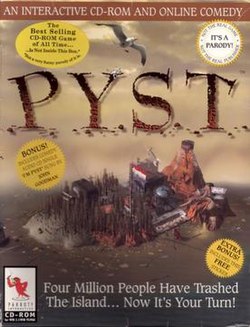Pyst
| Pyst | |
|---|---|
 |
|
| Developer(s) | Peter Bergman |
| Publisher(s) | Parroty Interactive |
| Distributor(s) | Mindscape |
| Platform(s) | Mac OS, Windows |
| Release date(s) |
|
| Genre(s) | Adventure, Parody |
| Mode(s) | Single-player |
Pyst (stylised as PYST) is an adventure computer game published in October 1996. It was created as a parody of the highly successful adventure game Myst. Pyst was written by Peter Bergman, a co-founder of the Firesign Theatre, and published by Parroty Interactive. Bergman, Stallone, Inc. was co-publisher of the title, while Mindscape began distributing the product on August 20, 1997. The parody features full motion video of actor John Goodman as "King Mattruss", the ruler of "Pyst Island". Versions of the game were produced for both the Windows PC and Apple Macintosh operating systems. Parroty Interactive was a division of Palladium Interactive, one of three main brands of Palladium, including Ultimate Family Tree and Palladium Kids. Parroty intended to create National Lampoon-esque "humorous CD-ROMs, web sites and other forms of interactive comedy". This title served as Parroty's debut game in the interactive parody space, to be followed by games like Star Wars parody Star Warped. The company is now defunct, and the game is not currently in publication.
The basic concept of Pyst was to show what Myst Island (from the best-selling game) would look like after four million people (players) had visited and "explored". Pyst developer and comedian Peter Bergman wanted to give Myst players the ability to "'experience the island in a whole new light". Palladium President Ed Bernstein wanted the game to be a "transformative work that moved way beyond Myst", in order to avoid copyright issues with Myst publisher Broderbund on the grounds of being a parody work. However, a spokesman from Broderbund said the company was unfazed with the project, commenting "We've seen imitators and they usually just give us a good chuckle".Bergman discovered that the sense of comic timing he had become accustomed to in his live shows couldn't be replicated in the digital realm, and had to adapt accordingly. Firezine said that the game was illustratory of Bergman's ability to "survey America's culture and obsessions like a maniacal monitor reflecting the absurdness of it all, while casting his iconoclastic eye to read the entrails of the present coarse and our delirious future".
...
Wikipedia
